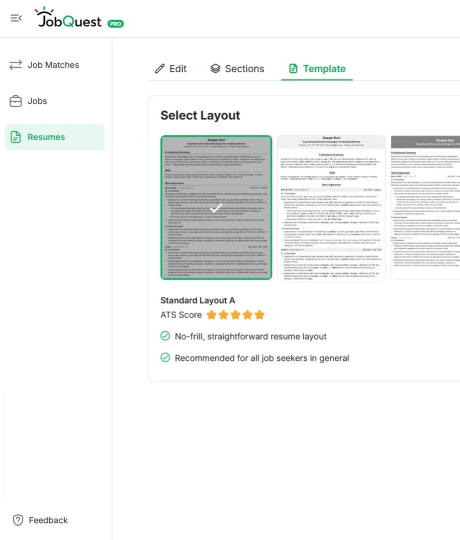What to Avoid When Writing a Job Targeted Resume

What Is a Resume
A resume is a professional document that summarizes your education, skills, experience, and accomplishments. A well-written resume highlights relevant achievements and provides employers with a valid reason to consider you for the job.
What Is a Targeted Resume
A targeted resume is customized to match a specific job description.
Unlike a generic resume, it has skills, experiences, and qualifications adjusted to match the job description.
For example, if the job requires “project management” skills, a targeted resume should emphasize your experience in leading teams and delivering projects.
1. Read the Job Description
Start by thoroughly understanding the employer’s requirements. Take note of relevant skills, qualifications, and certifications to include.
2. Highlight Transferable Skills
Emphasize skills that align with the job description, such as problem-solving or leadership, especially if transitioning to a new industry.
3. Customize for Each Role
Avoid a generic resume. Adapt your resume for each application to highlight what makes you the ideal candidate for that specific role.
4. Structure Strategically
Organize your resume to present the most relevant information first. For example, recent graduates may prioritize education over work experience.
5. Revise and Proofread
Before submitting, carefully review your resume for errors and ensure it’s polished and professional.
What to Avoid When Writing a Professional Resume
There are multiple mistakes you can commit when writing a targeted resume. Here are some to look out for.
Generic Content
Many job seekers make the mistake of creating a generic resume that lists everything they have professionally achieved, even if it’s irrelevant to the job. You need to tailor your resume to the specific job description.
A generic resume also shows that the job candidate is not interested or did not bother to look at the job description and just applied randomly.
Excessive Length
Resume length is often debated among recruiters, but the general consensus is that if you have less than 5 years of professional experience, your resume should be a single page because it’s a resume, not a newspaper.
Seasoned professionals, such as those with 10 years of experience or more, can opt for a two-page resume.
Poor Formatting
Formatting plays a key part in presenting your resume. If your resume is cluttered, then it is highly likely that the recruiter will get off-put by it and reject it.
Secondly, the applicant tracking system (ATS) might even filter out a complex resume. The ATS bot reads your resume from top to bottom, scanning for keywords related to the job description.
To improve readability, your resume should have clear sections, easy-to-understand bullet points, and proper white space.
Typos and Grammatical Errors
Having grammar and spelling mistakes in a resume can make you appear unprofessional and careless.
Always proofread and refine your resume before sending it in an application.
To take this one step further, consider getting your friends to review it because they might look at your resume from a different angle and tell you issues you never even imagined.
Irrelevant Job History
Listing every job you’ve had can clutter your resume and present a chaotic image of yourself. Consider removing irrelevant jobs and keeping only positions relevant to the job you are applying for.
Highlight experiences that best demonstrate your qualifications for the role you are applying for. Recruiters only have seven seconds to scan your resume, so we need to ensure they understand your message.
Overuse of Buzzwords
Most job seekers think that stuffing their resumes with keywords is the way to get their resumes through the Applicant Tracking System (ATS). However, that is not the case.
You should avoid overloading your resume with keywords and technical jargon. Instead, use clear and easy-to-understand language to describe your qualities and accomplishments.
Lack of Quantifiable Achievements
Writing only your job duties will not be enough. You need to quantify your achievements to demonstrate your impact.
Use numbers, percentages or outcomes to show what you achieved, as numbers speak louder than words. For example, instead of saying, “Managed a team of employees,” write, “Led a team of 10 employees.
Unprofessional Email Address
An email address is often not looked at, but it plays a significant role when recruiters actually go ahead and contact you for an interview.
Consider using professional email addresses that preferably have your full name, for example ,firstname.lastname@superobviousmail.com)
Omitting Contact Information
This one is similar to our last pointer. Many applicants never bother to fill in their complete contact information, and even if they do, it is not up-to-date.
Make sure to include your full name, phone number and professional email address.
Bonus Tip:
If you have a LinkedIn profile, consider adding it, as many recruiters like to dive deeper into a potential employes profiles.
Conclusion
Remember, your resume is not just a summary of your work history, it’s a tool to showcase why you are the ideal candidate for the role.
Take the time to refine and customize it for each application, emphasizing transferable skills, measurable achievements, and professional presentation.
With careful attention to detail, your resume can be the key to unlocking new career opportunities.

